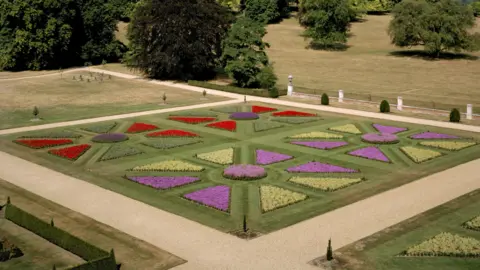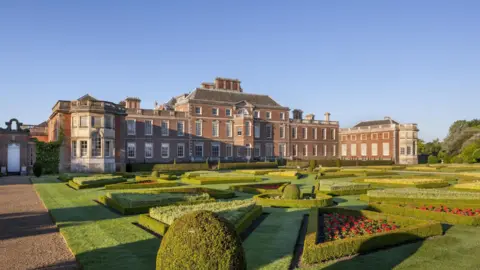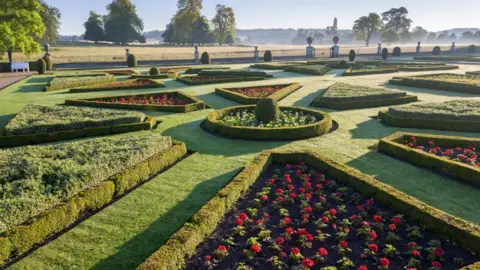Climate change forces National Trust garden redesign
 National Trust/PA
National Trust/PA- The Victorian-style parterre at Wimpole Hall is currently planted with annual bedding plants and bulbs
- This makes it more susceptible to "extreme weather conditions that are becoming more prevalent in East Anglia"
- At the end of the two-year project, the redesigned garden will also be more biodiverse
A 19th Century-style National Trust garden is to be redesigned to "reduce the stress from the extreme weather conditions" caused by climate change.
The 1.3 acre (0.5 hectares) parterre at Wimpole Hall, Cambridgeshire, is currently planted with annual bedding plants and bulbs.
Head gardener Tom Fradd said: "We now need to create a garden that can withstand significant temperature changes, where there's less need for watering and replacing plants."
The trust has appointed a landscape architecture team, including BBC Gardeners' World presenter Arit Anderson, to help create a more sustainable, climate-resilient and biodiverse planting scheme.
 The National Trust/PA
The National Trust/PAMr Fradd said: "The newly designed parterre will also be less susceptible to pests and disease, improve the condition of the soil and reduce the stress from the extreme weather conditions that are becoming more prevalent in East Anglia with the changing climate."
The estate was bequeathed to the National Trust by Rudyard Kipling's daughter Elsie Bambridge.
Its first parterre - a formal series of box-hedged triangular beds - was created in the 17th Century, but removed when garden fashions changed in the 18th Century.
 The National Trust/PA News
The National Trust/PA NewsThe current parterre is a 1990s replica of a design created in the 19th Century.
Andy Jasper, National Trust director of gardens and parklands, said: "The formal design was very effective but is getting harder to maintain so it's time for a bold, pioneering new chapter."
Not-for-profit organisation the Sustainable Landscape Foundation will work with trust gardeners on the project for the next two years.
Follow East of England news on Facebook, Instagram and X. Got a story? Email [email protected] or WhatsApp us on 0800 169 1830
